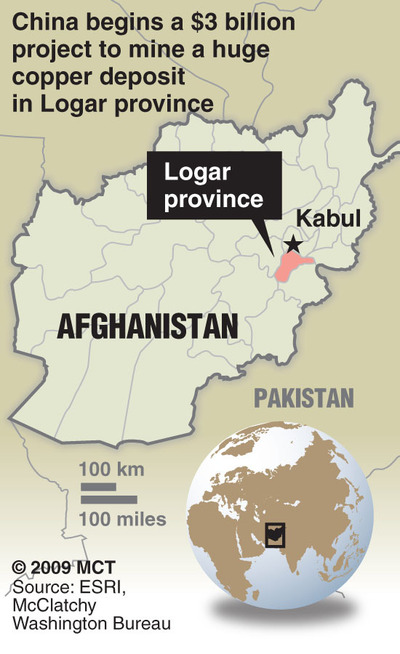A security strategy with no security
 Monday, May 3, 2010 at 11:05PM
Monday, May 3, 2010 at 11:05PM 
ARTICLE: "The Economic Underpinnings of China's Regional Security Strategy in Afghanistan," by Roman Muzalevsky, Eurasia Daily Monitor, 19 April 2010.
Gist:
Afghanistan increasingly relies on Chinese investments to promote its economic development. China, in turn, views Afghanistan as a source for raw materials and an important energy, transportation, and trade link that can enhance Beijing's regional security interests.
China is now the biggest foreign investor in Afghanistan, thanks to the billions plopped down on the Aynak copper reserve. But there's more, as I've noted here before:
Afghanistan has an estimated 1.6 billion barrels of oil and 440 billion cubic meters (bcm) of gas, deposits of ferrous and non-ferrous metals, iron ore and gold. The Chinese were so interested and active in the country's extractive sector that Bamian province officials noted the frequency of visits by Chinese delegations to the area. A western diplomat in Afghanistan was further prompted to state that "...only China can be the single most serious investor in the country..." (Kommersant, March 26).
And China is our natural SysAdmin partner in a more direct sense too:
Chinese contractor companies have additionally been involved in infrastructure work funded by Western sources throughout Afghanistan (www.fergana.ru, March 26).
The key part, referencing what I've been saying for a while:
Beijing is clearly focusing on economic, rather than military, engagement to bolster long-term security in Afghanistan and the region. It has trained 1,000 Afghan specialists in various fields, provided training and equipment to the Afghan army, and assisted with counterterrorism and counternarcotics activities (www.fmprc.gov, March 27, 2009).
Nonetheless, China has not set up regional military bases or deployed forces in Afghanistan despite its extensive peacekeeping experience. Nor has it chosen to work closely with NATO, the activities of which it treats with caution (China Daily, March 25). Beijing's related disinterest stems from its concerns about instability in its Muslim and restive Xinjiang Province that could result from expanded military involvement in Afghanistan. China also concentrates on building up its regional and global economic capabilities, choosing not to entangle itself in potentially exhausting military missions. It can thus "pick up the fruits" while others "are doing the heavy lifting" in Afghanistan, and also lay the foundation for long-term security in the region through economic development (Interfax, December 30, 2009).
Our blood, their oil, copper--whatever.
Works for them so long as we don't demand anything better.
Of course, our withdrawal will change things (another point I like to make in talks):
China feels no imperative at this stage to promote regional security by substantially expanding its military presence in Afghanistan. Its growing economic capabilities in the context of NATO's military involvement currently enables it to promote regional economic and security interests without committing itself militarily. However, the planned withdrawal of the coalition forces from Afghanistan by 2011, and Beijing's own rising regional influence might soon translate into a more pronounced military-based regional security strategy.
So don't kid yourself on China's "non-interference" and "soft power." You network and you get connected and you will end up having to defend.
Some learning curves are in the offing, to the benefit of all but the involved locals--at least in the short run.
Great piece.
[thanks to WPR's Media Roundup]











Reader Comments (1)